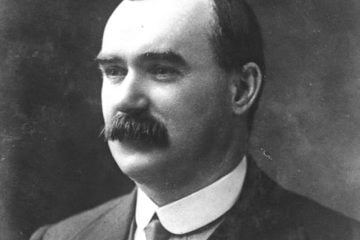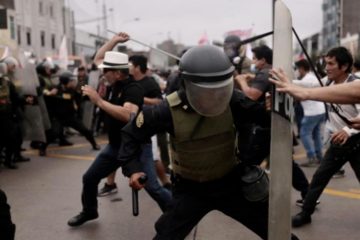The important result achieved by the FN in the European elections – and of the extreme right in other European countries – rightly provoked a wave of indignation among young people in France. The week after the elections, demonstrations, spontaneous in many instances, of several thousand school and university students took place in many large towns, including Paris.
The bourgeois media attempted to ridicule these demonstrations, the coverage of which certainly did not match the massive mobilisations of April and May 2002, at the time of Jean-Marie Le Pen’s qualification for the second round of the presidential election. Thus in the space of ten years it seems the FN has become normalised. Nothing at all has been written about it. The eagerness of the commentators in the service of the ruling class to play down the extent of the mobilisations of anti-FN youth is proof that they fear the emergence of a united movement of young people and workers’ organisations against the extreme right. It is with this unity that the power of the 2002 movement could be rekindled. This potential still exists – especially with the major crisis of capitalism which has been ongoing since 2008.
The ‘Citizens’ Marches Against the Front of Hatred’ were partly a product of individual calls promoted via social networks, like in Marseille for example, which proves the extent of the spontaneous anger against the FN, continually harboured by young people. These youth reject all forms of inequality, which was shown by the magnificent massive mobilisations against the expulsion of school students Leonarda and Khatchik, in the autumn of 2013. Due to its xenophobia and historical links with fascism, the FN is rightly perceived by a majority of young people as a particularly dangerous enemy against which constant vigilance is required.
Electoral gains
The FN clearly made gains in the presidential elections of 2012, by comparison with those of 2007. It has also gained in the municipal elections and the European elections this year compared to 2009. The bourgeois media happily broadcast its nationalistic campaigns in order to highlight anything that could divide the population along ethnic or religious lines. Elements of the programme of the FN were considered and implemented to a certain extent by those in power: naturally by the UMP, by also by the PS government, as with its heavy handed action against the Roma people. The influence of the FN is equally felt in certain sections of the state, like the police.
But beyond these connections that it has with “official” society, the main factor responsible for the gains of FN is the economic crisis and its consequences over the last 30 years: mass unemployment, the absence of a future for many people and the disintegration of society. Since the world crisis of 2008, the social violence of austerity has provoked the opening of a chasm between the population and the established order. The FN represents a tendency to direct this anger towards the Right, to the profit of the capitalist system, of which it makes minor criticisms without ever attacking it as the fundamental cause of crisis. Its social demagogy is a product of the absence on the Left of a credible alternative to capitalism. It is not surprising, given this, that the FN has found some support from those demographics hardest hit by the crisis: young people, workers and the unemployed.
However, these demographics have mostly taken refuge in abstentionism. The FN cannot reflect all the anger of young people and workers. It only partially profits from the general disgust felt towards the political class and the system that supports it. Even so, the continuing spectacle of corruption scandals and out-of-touch politicians will continue to fuel the growth of the FN.
Fascism?
Can we, at this time, talk about an imminent threat of fascism? For Marxists, fascism indicates a very different political scene, that of a militarised party and a government of civil war whose goal is the complete destruction of the workers’ organisations. Despite its links with small fascist groups, the FN’s programme states clearly that it aims to win and exercise power within the limits of the classical forms of bourgeois democracy – that will not happen without contradictions, however, as evidenced by the internal conflicts surrounding Le Pen.
The vast majority of French capitalists reject the protectionist measures detailed in the economic programme of the FN. Above all, they believe that the FN in power, at this stage, would provoke an explosion in the class struggle – similar to the mass movements caused by the rise of the Golden Dawn in Greece.
In the period to come, the FN will continue to play its designated role: to divide the workers amongst themselves, and demagogically attack the rest of the political class. Thus it is necessary to struggle especially hard against it. But this fight is one with higher stakes. We can neither put our trust in the institutions of the state (police, courts, or the discredited parties of the ruling class), nor in the narrow “vanguard” groups that are cut off from the mass of young people and workers. The spontaneous mobilisations against the FN show the potential. We must develop our organisation further, for example through the committees of struggle and mobilisation against the FN, building unity with political organisations and unions of young people. The spontaneous anger expressed by the youth during the last demonstrations would, through such organisation, find an instrument capable of taking the fight to a higher level: the fight against the FN must be integrally a part of the fight against the capitalist system which nurtures that party and of which the FN is one of the fiercest defenders!
by Pierre Ginon, CGT Educ’Action 94
Source: http://www.lariposte.com/La-jeunesse-emmerde-toujours-le.html



